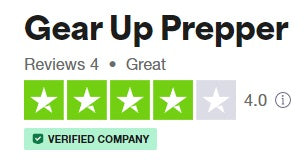Living in a world where uncertainties abound, it's crucial to be ready for unforeseen emergencies and disasters. Whether facing natural calamities like hurricanes, earthquakes or wildfires or dealing with societal disruptions such as power outages or economic downturns, having a solid plan in place can greatly enhance the safety and well being of both yourself and your family. Prepping, which stands for preparedness, involves actively getting ready for emergencies by acquiring the necessary knowledge, skills and supplies to not just survive but thrive during challenging conditions. If you're new to prepping and looking to kickstart your preparation journey from square one, this detailed guide is tailor made for you.
When starting your preparedness journey, focus on the essentials like food, water, shelter and safety first before delving into more specific needs.
1. Independence; Embrace the idea of self reliance and self sufficiency. While external assistance might be accessible in emergencies, it's vital to be able to depend on yourself and your own resources, especially during the initial phases of a crisis.
2. Learning and Skills; Dedicate time to gaining the knowledge and expertise required for survival and readiness. This includes training in first aid, mastering outdoor survival skills, understanding basic medical principles and becoming proficient in using essential tools.
3. Adaptability; Stay open to adjusting your plans as needed based on changing situations and new information. It's important to be flexible in your approach to preparedness.
4. Building Connections; Connect with individuals and groups who share your dedication to preparedness. Work together, exchange resources and offer assistance when required.
Remember to stock up on enough non perishable food for three days and have one gallon of water per person each day.
For medical needs, make sure you have a first aid kit with essential supplies, medications and any required prescription drugs.
Pack blankets, sleeping bags, tarps and other items for shelter and warmth if you need to evacuate or stay put in a safe place.
Don't forget to include tools like a multi tool, flashlight, batteries, matches, whistle, duct tape and other necessary equipment.
And remember your personal hygiene items like toilet paper, soap, hand sanitizer and feminine hygiene products.
Create a plan for staying connected with family members during emergencies. Set up meeting spots and alternative communication methods in case regular channels fail.
Take the time to learn basic survival skills that could be handy in emergency situations.
Here are some important skills to learn;
First Aid; Understand how to provide basic first aid and CPR.
Fire Starting; Become proficient in starting fires using different methods like matches, lighters, fire starters and friction based techniques.
Shelter Building; Learn how to create emergency shelters using natural materials or tarps.
Water Purification; Get familiar with various ways to purify water for safe consumption, such as boiling, chemical treatment and filtration.
News
A Newcomers Manual, to Emergency Preparedness; Getting Started with Prepping






